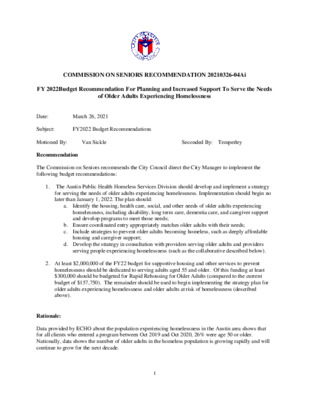20210326-04Ai FY 2022 Budget Recommendation For Planning and Increased Support To Serve the Needs of Older Adults Experiencing — original pdf
Recommendation

COMMISSION ON SENIORS RECOMMENDATION 20210326-04Ai FY 2022Budget Recommendation For Planning and Increased Support To Serve the Needs of Older Adults Experiencing Homelessness March 26, 2021 FY2022 Budget Recommendations Date: Subject: Motioned By: Recommendation The Commission on Seniors recommends the City Council direct the City Manager to implement the following budget recommendations: Seconded By: Temperley Van Sickle 1. The Austin Public Health Homeless Services Division should develop and implement a strategy for serving the needs of older adults experiencing homelessness. Implementation should begin no later than January 1, 2022. The plan should: a. Identify the housing, health care, social, and other needs of older adults experiencing homelessness, including disability, long term care, dementia care, and caregiver support and develop programs to meet those needs; b. Ensure coordinated entry appropriately matches older adults with their needs; c. Include strategies to prevent older adults becoming homeless, such as deeply affordable housing and caregiver support; d. Develop the strategy in consultation with providers serving older adults and providers serving people experiencing homelessness (such as the collaborative described below). 2. At least $2,000,000 of the FY22 budget for supportive housing and other services to prevent homelessness should be dedicated to serving adults aged 55 and older. Of this funding at least $300,000 should be budgeted for Rapid Rehousing for Older Adults (compared to the current budget of $157,750). The remainder should be used to begin implementing the strategy plan for older adults experiencing homelessness and older adults at risk of homelessness (described above). Rationale: Data provided by ECHO about the population experiencing homelessness in the Austin area shows that for all clients who entered a program between Oct 2019 and Oct 2020, 26% were age 50 or older. Nationally, data shows the number of older adults in the homeless population is growing rapidly and will continue to grow for the next decade. 1 The number of older adults in the population of people experiencing homeless requires us to revisit and adapt assistance programs that were designed to address the needs of a much younger group and fail to account for medical, social, and emotional needs that emerge later in life. Older adults experiencing homelessness have diverse needs related to their housing, health care, social, and other needs. Further, the stresses of homelessness cause premature aging; Austin already classifies aged 55 and older in this population as older adults. In October 2020, a collaborative was formed in Central Texas to find ways to address the special needs of this aging homeless population. Members include representatives from both the aging and homeless space in non-profit, for-profit and governmental organizations. Participants include: Family Eldercare, Adult Protective Services, ECHO, Integral Care, UT School of Nursing and Social Work, Front Steps, Salvation Army, City of Austin Public Health, SAFE, Area Agency on Aging, Drive a Senior ATX, Central Health, Texas Health Action, Coming of Age, Care Patrol and Joy Of Life Home Health and Hospice. Individual members agencies in the Austin area are reporting: • • increased numbers of older adults in their programming a lack of specialized services and housing for older adults who are homeless to assist with additional needs such as cooking, shopping, bathing, dressing, grooming, toileting etc. Many are not appropriate for a nursing home but need daily living support. older adults with disabilities and care needs being discharged from hospitals, nursing homes or jails and dropped off at shelters. The shelters are unable to help meet their basic needs such as transferring, dressing/bathing, toileting etc. • Below is a chart based on data from ECHO showing individuals 50+ (2634 total) and their disability type: 2 Although the Coordinated Entry system identifies persons aged 55 and older, there are virtually no programs to serve the specific needs of older adults experiencing homelessness. The APH Homeless Services Division identified one program, Rapid Rehousing for Older Adults, funded at $157,750. Further, there is no strategy focused on the needs of older adults. The dedicated funding would allow more effective interventions targeted to the special needs of older adults and their caregivers. The Commission on Seniors believes the City should put the same focus and dedication to addressing the needs of older adults in the homeless population as we did in striving to end homelessness for Veterans. Vote For: Briesemeister, Varteressian, Angel, Bordie, Hauser, Lugo, Nicola, Temperley, Van Sickle, Spain Against: None Abstain: None Absent: Cagle, Kareithi, Garcia-Pittman, Jackson Attest: Janee Briesemeister, Chair 3